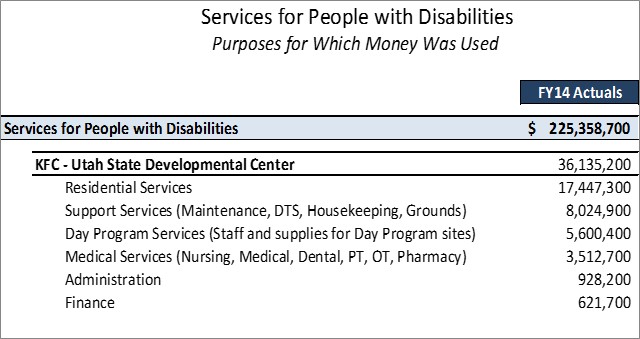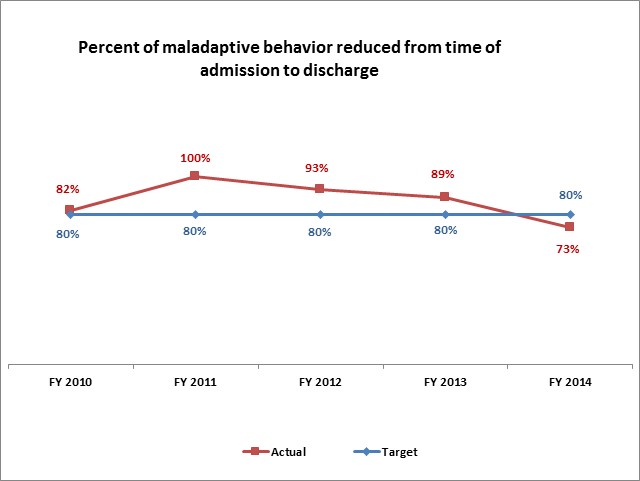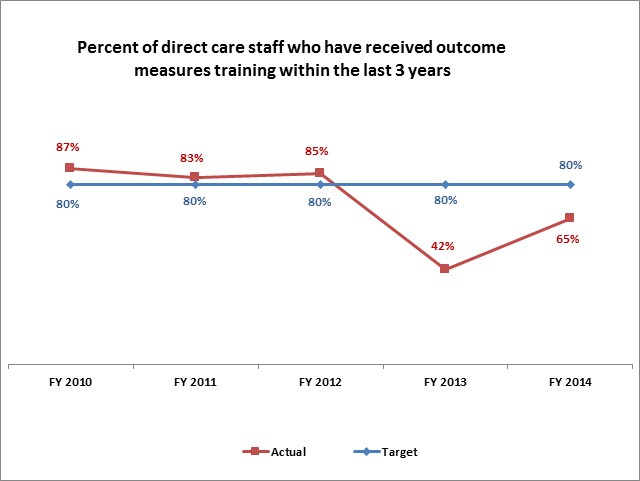The Utah State Developmental Center (USDC), formerly known as the Utah State Training School, is a publicly funded and managed Intermediate Care Facility for Individuals with an Intellectual Disability (ICF/ID). The center provides 24-hour residential and active treatment services. Specialized services include: medical and dental services; physical, occupational, speech, and recreational therapy; psychological services; social work; and day training.
Additional information regarding the Utah State Developmental Center can be found on its official website found at: Utah State Developmental Center
During the 2015 General Session, the Legislature appropriated for Fiscal Year 2016, $37,788,400 from all sources for Utah State Developmental Center. This is a 4.3 percent increase from Fiscal Year 2015 revised estimated amounts from all sources. The total includes $10,850,200 from the General/Education Funds, an increase of 6.7 percent from revised Fiscal Year 2015 estimates.
In addition to statewide compensation and internal service fund cost increases, the following appropriation adjustments were made during the 2015 General Session:
For the most recent completed fiscal year, the following information represents the purposes for which the money was used:

The Utah State Developmental Center is considered a statewide program including all rural areas and is open to all residents of Utah with intellectual disabilities eligible for care as determined by an intensive screening and governed by UCA 62A-5-3. For FY 2014, the daily cost of services for residents of the USDC was $491.51 per person ($179,400 annually). There is no statutory requirement for distribution of funds or allocation of slots by geographic region.


Regarding the positive trend greater than 5% in the maladaptive behavior reduced from the Utah State Developmental Center (USDC) performance measures, the agency states, "During 2014 a crisis admission from the community to USDC occurred once a month, sometimes more often. These people came from a jail, an acute care hospital psych unit or directly from home. All these individuals were involved in some sort of violent behavior and most had assault charges pending. None of the forty plus community waiver providers in the community was capable or willing to care for these individuals. There was nowhere else for these violent people to go. USDC has seen an increase of very aggressive disabled individuals. The population mix at USDC is changing. The facilities in which these individuals go to in USDC are older and slated for replacement. Staff turnover in these areas is high. Regardless, teams at USDC provide early intervention, behavior support plans, medical support and psychiatric intervention. This early transition prevents a continuation of behaviors seen in the community. In other words, the team at USDC works very well right at the time of admission and even before to provide interventions that mitigate and reduce behaviors from the beginning. Individuals are helped at the onset and result in fewer behaviors needing reduction. If the plan works at admission and there are very few behaviors then there will be a negligible reduction in this number. This positive result reflects upon DSPD as a whole in the actions to control some very aggressive and assaultive individuals and the willingness of providers in the community to take them back once they have been stabilized. A community provider will now accept a transfer from USDC without a blemish free record. In the past an individual had to go years without a behavior before a waiver provider would accept their care. The number no longer needs to be zero so that percentage measure has increased.
Regarding the negative trend greater than 5% in the percent of direct care staff who have received outcome measures training from the Utah State Developmental Center (USDC) performance measures, the agency states, "Turnover rates in the direct care staff at USDC is high, 75%, making it difficult to get staff into Outcome training once they are hired and then retain them once they are trained. Outcome training involves a full week of training outside the direct care arena. There have been few weeks when the luxury of pulling staff out of direct care for a week at a time was possible. Reporting in FY 2013 was reported incorrectly initially but was corrected with a response similar to this year. The correct percentage for FY 2013 was 81%, 2014 65%."
In December of 1989, a class action lawsuit, known by the title of Lisa P., was filed against the state by the Disability Law Center and the Association of Retarded Citizens (ARC) of Utah on behalf of all residents of the USDC. A settlement agreement was entered into in October of 1993 that required an evaluation of each resident to determine appropriate placement. Due in large measure to the terms of the settlement agreement, USDC has seen its population decrease from about 425 in 1991 to 203 today.
The Developmental Center has restructured its delivery system. This has involved remodeling many of its dormitory-type housing units into apartments with one to three bedrooms which has provided more independence and privacy for its residents. This has altered the Center's care delivery system, requiring a greater staff-to-client ratio. This has served to decrease the behavior problems of residents and improve their quality of life.
COBI contains unaudited data as presented to the Legislature by state agencies at the time of publication. For audited financial data see the State of Utah's Comprehensive Annual Financial Reports.